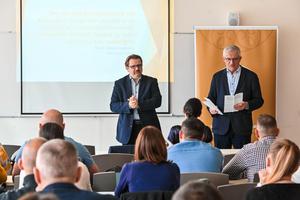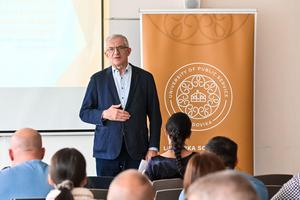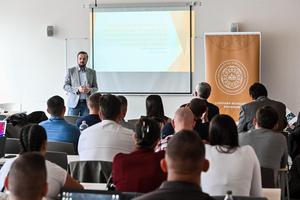In the framework of the Ludovika Scholars Program, Jarosław Szczepański, associate professor at the Faculty of Political Science and International Studies, University of Warsaw, founding editor-in-chief of the Polish Journal of Political Science, lecturer at the Institute of Law of the Polish Academy of Justice, gave a public lecture and a short workshop at the Faculty of Public Governance and International Studies.
On the occasion of his public lecture, Péter Krisztián Zachar, Vice-Dean for International Affairs, welcomed the guest, followed by Ambassador Iván Gyurcsík, Senior Advisor to the Rector and Director of the Ludovika Scholars Program, who presented the role of the flagship university program in internationalisation. Jarosław Szczepański then presented the stages in the development of a specific integration process through which transnational economic integration has been achieved while fully respecting state autonomy and sovereignty. This specific framework is the 1973 Trans-Tasman Travel Arrangement (TTTA) between Australia and New Zealand, which has a significant impact on the movement of citizens between the two countries. The main aim was to facilitate the free movement of citizens, and the agreement also opened up the possibility for residents to live and work in both countries, fostering closer ties between the two nations. Unlike the traditional treaties, this agreement, initiated in 1973, relies on a set of immigration procedures and common political support, with specific considerations for national security and public service roles but no treaty framework for free movement. In later years, however, economic differences and the resulting migration trends have led to new arrangements. Initially, New Zealanders living in Australia could access benefits directly, but from the 1980s, adjustments were made, for example, to make access to social benefits conditional on six months' residence and then two years' permanent presence. More recently, to ensure the continued free movement of New Zealanders to Australia, a special category of visa has been introduced, which is automatically granted (subject to health and personal conditions) and electronically recorded. Unlike other citizens, it is not necessary to obtain a visa prior to arrival and, unlike other temporary visas, this visa is not time-limited for New Zealand citizens. In this way, the TTTA area is an example of a highly specific integration process, with both specific visa requirements and employment conditions.
In the framework of the Ludovika Scholars Program, Jarosław Szczepański then presented a special workshop for interested students on the Polish state scholarship opportunities and the practical application skills that are essential for them. The focus of interest and the presentation was on special state grants for the entire Master's programme, as well as part-time scholarships and research grants for doctoral students.
Text: International Division, FPGIS, LUPS
Photos by András Szabó, Dénes Szilágyi




